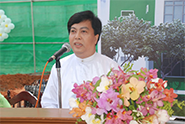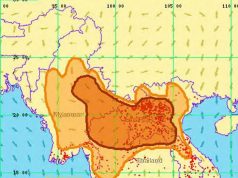Name : Dr Zaw Min Aung
Profession: Engineer
Brief Background: Dr. Zaw Min Aung graduated from the Yangon Institute of Technology in 1991. After working at differ- ent positions at the University until the Pro Rector, under the Ministry of Science and Information technology, he became the Di- rector General of the Department of Tech- nical and Vocational Education, in 2010. He completed his master’s degree in Electrical Engineering in Japan and obtained a PhD in Russia. In 2012 February, Dr. Zaw Min Aung was promoted to the position of the Deputy Minister of the Ministry of Science and Technology. Six months later, he was transferred to the ministry of Education as Deputy Minister.
MI: Why were you transferred to the Ministry of Education?
In my opinion, government is currently initi- ating the educational reform process and in- ternationally experienced persons are need- ed for implementation. So I was reshuffled as Deputy Minister for Education.
MI: Can you explain a bit on the cur- rent structure of the education minis- try?
Currently, Education Ministry is divided in two large sections, basic and tertiary educa- tion. There are nine departments that im- plement actions for those two sections. All are important and fundamental. The depart- ment of basic education is divided into three departments, I, II and III. The Department of Higher Education is further divided based on geographical areas of upper and lower Myanmar. There are also Department of planning and training, Myanmar Education- al Research Bureau, Department of Myan- mar Board of Examinations.
MI: What are the key initiatives of the education ministry at present?
The new government team started a pro- gram promoting the free primary education program in 2011. Starting from this year; we are initiating a free education program for the lower secondary levels. In the coming year, we aim to start free programs for high- er secondary levels.
Most importantly, the new national edu- cation bill will come out soon. It is already approved by the upper and lower house. It is now awaiting final approval from President’s office.
MI: What are the significant features of this new law?
First, the basic education will be changed into k+ 12 system. Currently, we only have ten grades (standards) but we will change it into ASEAN standard system which has 12 grades. There will be changes to exam- ination system. Previously, matriculation exam is most important for the entrance into universities. Under new system, we will still have the exam but it will be more dependent on the interest of the student. They will have the chance to choose whatever course they desire.
For higher education, we want universities to be fully autonomous. We will permit them both acedemic freedom and other adminis- tration independence. They will be able to work freely with their own charters. We will promote comprehensive universities where different schools fall under the university umbrella. Each school can be a centre of ex- cellence under their own brand names.
MI: How will those universities get required budgets?
The government will give them a lump sum. The regional government will also provide them and there will be a self-funding sys- tem too. A statement relating with funding system has already been put in the National Education Bill. MI:
What are the key policies on the private school education?
Concerning with the private school educa- tion, we are aiming to reach PPP (Public, Private Partnership). We want students from private schools to be able to transfer to the public schools and vice visa. The teachers from private schools will be able to partici- pate in the training programs by the govern- ment and education ministry. There will be placement tests for those students who want to transfer to the public schools. The schol- arship programs will also be the same. It will be more like exchange of talents.
MI: What roles do you foresee for the private higher tertiary education?
In my opinion, requirement of skilled pri- vate labors plays an important role in the development of the country. We need many skilled experts. So I am really delighted that now private sector is cooperating with the government. Now I think it will fill the gap that government currently cannot pro- vide.. In other countries, we can see more vocational and skill trainings by the private sector. I see many young people with lots of potentials in Myanmar. So I think it will be great opportunity.
MI: How will the government coop- erate with private tertiary education providers in areas like certifications and regulations?
Like I said, there are many sectorial laws un- der the national education bill. One of them is private sector education law including their rights, responsibilities, opportunities and things that the government will provide the detailed rules currently under negotiation.
We are making three important laws for basic/higher education, tertiary education and the private sectors. Currently we already have the drafts but we will amend them again. Now we are still at the stage of observ-ing other counties laws.
MI: How the ministry will recognize the international certificates in pri- vate sectors?
Well, it is currently being discussed that too. So that we cannot tell much. Most important thing is to get the mutual recognition and ar- rangements to credit transfers.
We are looking forward to balance the na- tional qualification framework (NQF) to ASEAN level. We will take advices and inputs as much as from the private sector education experts at the coming forum and amend the law if necessary. We have a working group focusing on the relating issues.
MI: What are the policies for the peo- ple who want to establish private uni- versities?
Until now, all businesses which have named as private universities are registered as ser- vices. The current procedure is firstly to es- tablish a company and register as a service provider. We still need a regulatory body for the private university establishment. To fill the gap, we will make a by-law. But currently they can only work as service providers.
MI: Is there any large amount of FDI in education sector so far?
I have seen some joint ventures. Most of them are government to government. Like Singapore polytechnic and Myanmar Insti- tute of Information technology (MIIT) in Mandalay .The latter is joint venture invest- ment between the government of India and Ministry of Science and Technology under the government of Myanmar.
MI: As we’ve read in newspapers,presidential scholarships being given away in this year. Please elaborate.
The main intention of our scholarship pro- grams is to encourage new generation of Myanmar youths. Our government team wants to support the young people who will become leaders in the future. We also want to get more specialists. With scholarships from other countries, students do not have much choices. They can only apply what doners give. In the presidential scholarship programs, there will be many specializations such as microfinance and other related sub- jects in economic, retina specialization for eyes specialists in medicine, etc.
We will give priority so that they can choose based on their interest. No restrictions from government at all.
MI: What would be the message from your education ministry to the people of Myanmar?
Education is a lifelong learning process. Currently, there are about eight million stu- dents in primary education level. Along with their parents and grandparents, there is for- ty eight millon people relating to education. Education is related to the whole state. I just want to say education for all , and all for ed- ucation. So we need cooperation of everyone to gain the momentum of moving forward. We need inputs from everyone.










